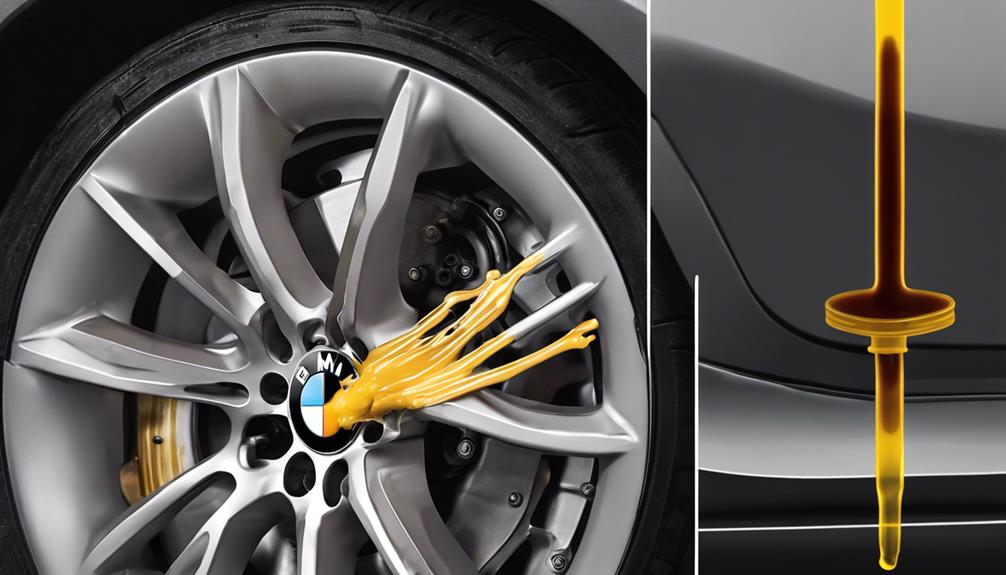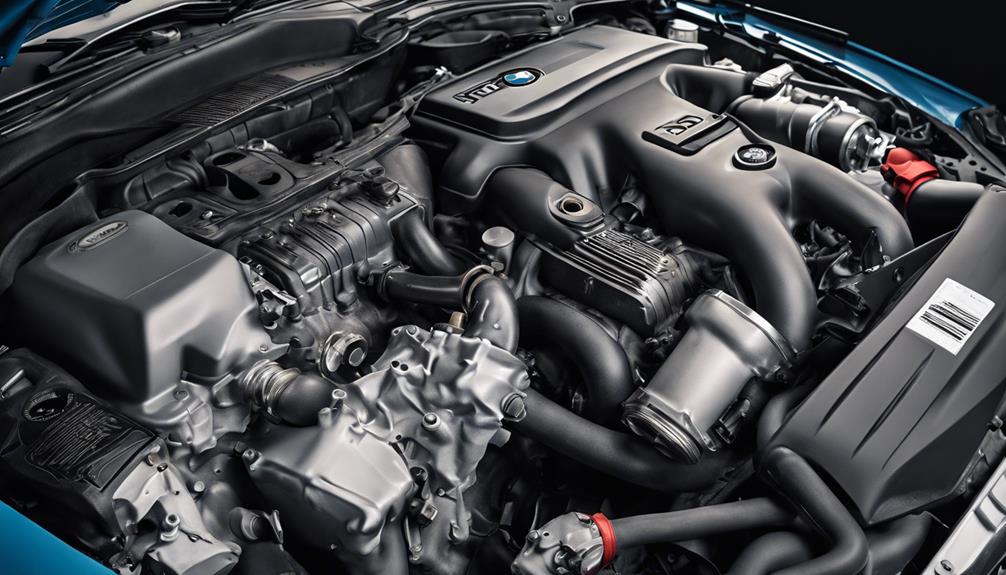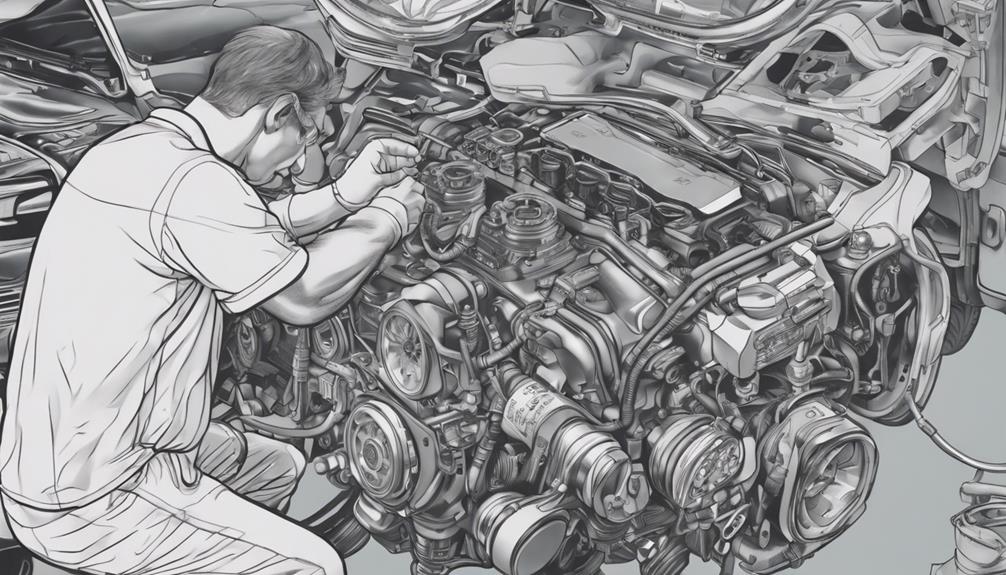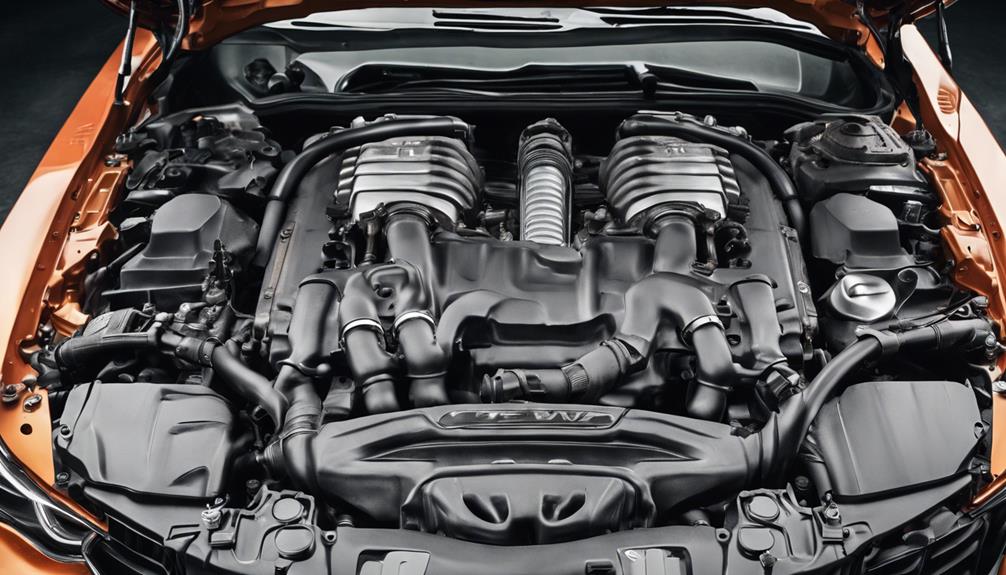If you've been dealing with rough shifting, jarring downshifts, or gear slippage in your BMW F10, those notorious transmission issues might be at play. These problems are often accompanied by loud clunking noises during gear changes, indicating potential gearbox trouble. Causes range from transmission failure to low fluid levels or software glitches affecting performance. Addressing these symptoms promptly can prevent further damage and guarantee your F10 stays running smoothly. The intricacies of diagnosing and repairing BMW F10 transmissions go beyond just these surface issues.
Key Takeaways
- Rough shifting, jerking downshifting, and slipping gears are common transmission issues in BMW F10.
- Low transmission fluid levels can lead to transmission failure.
- Loud clunking noises during shifting may indicate transmission problems.
- Software glitches may require a reset to address performance issues.
- Promptly address symptoms to prevent further damage and seek professional repair.
Common BMW F10 Transmission Issues

If you're a BMW F10 owner, you're likely familiar with the notorious transmission issues that can plague this model, causing rough shifting and unsettling jerks during downshifting. The BMW F10 5 Series has been known to exhibit these transmission problems, which can be frustrating for drivers. Whether you have a manual or automatic transmission, experiencing jerking while downshifting is a clear indicator that your vehicle may be facing transmission issues.
Additionally, reports of transmission slipping gears and loud clunking noises during shifting have been prevalent among F10 owners. When faced with such issues, it's essential to seek assistance from a qualified BMW repair technician. While the dashboard warning light may not always accurately pinpoint transmission problems, a thorough inspection by an experienced professional can help diagnose and resolve the issue promptly.
Keep in mind that transmission problems in the BMW F10 could stem from various causes, including transmission failure, low fluid levels, or software glitches that may require a reset.
Symptoms of Transmission Problems
Feeling like your BMW F10 is having a rough time shifting gears?
Those jerks during downshifting might be a red flag for transmission troubles.
Keep an ear out for loud clunks too; they could be the gearbox's way of saying, 'Houston, we've a problem.'
Warning Signs
Experiencing rough shifting, jerking downshifts, or clunky gear changes in your BMW F10 could be indicative of underlying transmission problems. If you notice loud clunking noises during gear shifts, it might be a sign of potential transmission issues.
While dashboard warning lights can sometimes alert you to problems, they may not always accurately reflect transmission issues, highlighting the need for a thorough inspection.
Common causes of transmission problems in BMW F10 models include transmission failure, low fluid levels, and software malfunctions. To address these concerns and prevent major issues, it's advisable to seek prompt inspection and repair by qualified BMW technicians.
Stay vigilant for these warning signs to guarantee the smooth operation of your BMW F10's transmission.
Diagnostic Steps
When diagnosing transmission problems in your BMW F10, closely monitor for subtle changes in shifting behavior that may signal underlying issues. Symptoms such as rough shifting, jerking during downshifting, or skipping gears could indicate potential transmission issues in your BMW F10.
Keep an ear out for clunking noises during shifting, as these could also point towards transmission problems.
Remember, dashboard warning lights in BMW F10 models may not always accurately reflect transmission issues, so it's vital to pay attention to how your car is actually performing.
Common causes of transmission problems in the BMW F10 include low transmission fluid levels or software malfunctions. To tackle these issues effectively, prompt diagnosis and repair by qualified BMW technicians are necessary.
Repair Options
Repair choices for BMW F10 transmission issues involve dealing with the symptoms promptly to prevent further damage and guarantee exceptional performance of your vehicle. When faced with rough shifting, jerking, or slipping gears, seeking professional repair is vital. Technicians may diagnose problems such as transmission failure, low fluid levels, or software glitches requiring a reset.
Addressing clunking noises during gear shifts promptly can prevent potential transmission damage in your BMW F10 5 Series. Remember, dashboard warning lights may not always accurately reflect transmission issues, so a thorough inspection by qualified BMW technicians is key.
Causes of Transmission Failure
Low transmission fluid can spell trouble for your BMW F10, potentially leading to transmission failure.
Keep an eye out for software glitches that may necessitate a reset to avoid transmission issues.
Neglecting regular maintenance increases the risk of encountering transmission problems and potential failure in your BMW F10.
Common Transmission Issues
Experiencing rough shifting in both manual and automatic transmissions is a prevalent concern among BMW F10 5 Series owners, indicating potential underlying transmission issues. Jerking during downshifting and slipping gears are common problems in BMW F10 models, leading to discomfort and frustration for drivers.
Additionally, loud clunking noises during shifting serve as warning signs of possible transmission issues in the BMW F10. It's important to note that the dashboard warning light may not always directly point to a transmission problem, underscoring the necessity for accurate diagnosis to address BMW F10 transmission issues promptly.
Being proactive in addressing these transmission issues can help maintain the performance and longevity of your BMW F10, ensuring a smoother driving experience.
Overheating and Wear
If you're noticing rough shifting in your BMW F10 5 Series, the risk of transmission failure due to overheating and wear becomes an important concern. Overheating, often caused by clogged cooling systems or faulty thermostats, can lead to transmission wear and damage.
Incorrect coolant usage exacerbates overheating, further increasing the chances of transmission problems. Timely maintenance is vital to prevent overheating issues that could affect the transmission's performance.
Additionally, water pump failures in BMWs can contribute to engine overheating, potentially impacting the transmission as well. Addressing thermostat failures promptly is essential to prevent engine overheating, which is a key factor in avoiding transmission issues.
Stay vigilant about maintenance to keep your BMW F10's transmission running smoothly.
Fluid Contamination Risks
Contaminated transmission fluid poses a significant risk of premature failure in BMW F10 transmissions, leading to increased friction and wear on internal components. To avoid the dreaded transmission failure light, it's important to understand the dangers of fluid contamination:
- Dirt, metal particles, and moisture can infiltrate the transmission fluid, causing havoc inside.
- Overheating becomes a real threat, reducing efficiency and potentially damaging components.
- Poor lubrication due to contamination accelerates wear and tear on essential parts.
- Regular maintenance checks are essential to detect and prevent fluid contamination issues.
- Ignoring these risks could result in costly repairs or even a complete transmission failure, leaving you stranded.
Stay ahead of the game by prioritizing proper fluid maintenance.
Diagnostic Procedures for F10 Transmissions
When diagnosing transmission issues in BMW F10 vehicles, technicians rely on specialized tools to scan the computer system for error codes related to potential problems. These diagnostic procedures are important for BMW mechanics to accurately pinpoint the root cause of transmission issues. Using advanced diagnostic equipment, mechanics can monitor real-time transmission parameters to identify any anomalies effectively. The table below illustrates the systematic approach involved in diagnosing F10 5 Series Transmission problems.
| Diagnostic Procedures | Description | Importance |
|---|---|---|
| Computer System Scan | Utilizes specialized tools to check for error codes | Essential for identifying issues |
| Fluid Level Check | Assesses transmission fluid levels and condition | Critical for proper transmission function |
| Component Inspection | Examines transmission components for wear or damage | Helps in determining necessary repairs |
| Test Drives | Conducted to replicate and verify reported symptoms | Validates the presence of issues |
Fluid Levels and Transmission Health

To grasp the importance of maintaining proper transmission fluid levels in BMW F10 vehicles, consider how insufficient fluids can impact transmission performance and longevity. Guaranteeing that your transmission has the correct amount of fluid can make a world of difference in how your car shifts and operates. Here are a few key points to keep in mind:
- Transmission Slipping: Low fluid levels can cause your transmission to slide between gears, leading to a lack of power and efficiency.
- Rough Shifting: Insufficient fluid can result in rough and jerky gear changes, making your driving experience less smooth.
- Appropriate Fluid Levels: Sustaining the proper amount of transmission fluid is crucial for the health and longevity of your BMW F10's transmission.
- Monitoring and Maintenance: Regularly checking and topping up your transmission fluid can help you avoid costly repairs down the road.
- Preventing Issues: By staying on top of your fluid levels, you can prevent potential transmission problems and ensure your car runs smoothly.
Software Resets for Transmission Issues
For addressing transmission issues in your BMW F10, consider utilizing a software reset as a potential solution to minor performance hiccups.
Performing a transmission reset on your BMW F10 involves a straightforward process of pressing the start button without engaging the brake, then holding down the accelerator for about 60 seconds. This reset can help address software issues that may be causing minor disruptions in your transmission's performance.
However, it's important to note that while a software reset can offer a temporary fix, it may not resolve underlying problems within the transmission system. Therefore, it's advisable to follow up with a professional checkup to diagnose any persistent issues accurately.
Electronics are integral to the proper functioning of your car's transmission, impacting safety, efficiency, and overall performance. By ensuring you follow the correct steps for a transmission reset, you can proactively manage minor issues and maintain the best performance of your BMW F10 transmission.
Professional Repairs for F10 Transmissions

Bavarian Rennsport's expert technicians specialize in providing precise repairs for BMW F10 transmission issues, ensuring excellent performance and longevity for your vehicle. When it comes to professional repairs for your BMW 5 Series transmission problems, trust in the expertise of Bavarian Rennsport to deliver exceptional service.
- Thorough diagnostic assessments to pinpoint the root cause of your F10 transmission issues.
- Skilled technicians equipped with the knowledge to address specific problems in your BMW's transmission system.
- Utilization of high-quality parts and tools to guarantee long-lasting repairs for your F10.
- Transparent communication regarding the repair process, ensuring you're kept informed every step of the way.
- Precision servicing that aims to not only fix current issues but also prevent future transmission problems, safeguarding the longevity of your BMW 5 Series.
Trust Bavarian Rennsport for outstanding professional repairs that prioritize the performance of your F10.
Preventative Maintenance Tips for Transmissions
Ensure peak performance and longevity for your BMW transmission by implementing these critical preventative maintenance tips. Regularly checking transmission fluid levels is crucial to guarantee proper lubrication and cooling, preventing overheating and wear.
Following manufacturer-recommended service intervals for transmission maintenance helps in early detection of potential issues, saving you from costly repairs down the line. Address any unusual noises, jerking, or slipping gears promptly to prevent further damage and maintain smooth operation.
It's vital to have a qualified BMW technician conduct a detailed inspection of the transmission system to catch any underlying problems early on. Additionally, timely software updates and resets can optimize your transmission's performance and efficiency.
Importance of Timely Transmission Repairs

Ensuring timely repairs for your transmission can be the key to preventing minor issues from snowballing into costly and disruptive problems. Here are some compelling reasons why addressing transmission repairs promptly is essential:
- Smooth Vehicle Operation: Timely transmission repairs contribute to a smoother and more efficient vehicle operation experience.
- Costly Repairs Avoidance: By addressing transmission issues promptly, you can avoid costly repairs down the line.
- Safety Concerns: Ignoring transmission problems not only leads to expensive fixes but also poses potential safety hazards on the road.
- Extended Lifespan: Regular maintenance and timely repairs can greatly prolong the lifespan of your transmission.
- Professional Diagnosis: Seeking professional diagnosis and servicing for transmission problems is vital for ensuring the longevity and best performance of your vehicle.
Frequently Asked Questions
How Do I Know if My BMW Transmission Is Bad?
To know if your BMW transmission is bad, watch out for signs like rough shifting, jerking, or gear slipping. Listen for clunking noises and keep an eye out for sudden speed drops. If in doubt, consult a qualified technician promptly.
What Is the Transmission Problem on the BMW Series 5?
When your BMW Series 5 faces transmission issues, rough shifting, jerking downshifts, slipping gears, and clunking noises could be the culprits. The warning light might not help, but a professional diagnosis can pinpoint the problem accurately.
What Is the Problem With the BMW F10?
You need to know about the BMW F10's common problems. From transmission issues like rough shifting to mysterious dashboard lights, being informed can help you tackle any car trouble with confidence.
How Do You Reset the Transmission on a BMW F10?
To reset the transmission on your BMW F10, simply press the start button without the brake, hold the accelerator for 60 seconds. This recalibrates the system, addressing sensor glitches or software issues. Seek professional help if problems persist.
Conclusion
You now have a better understanding of the common transmission problems that can plague BMW F10 vehicles.
By recognizing the symptoms, understanding the causes, and implementing preventative maintenance tips, you can avoid costly repairs and keep your transmission running smoothly.
Remember, timely repairs and maintenance are key to ensuring your F10's transmission stays in top condition.
Drive smart, and your BMW F10 will thank you with flawless performance on the road.








